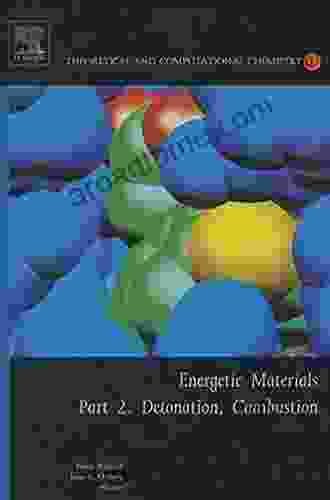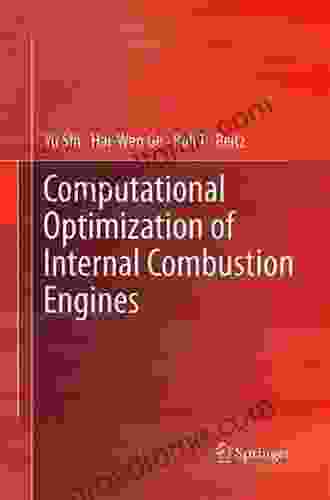Computational Optimization of Internal Combustion Engines: Revolutionizing Engine Design

Internal combustion engines have played a vital role in shaping modern society, powering everything from automobiles to power plants. However, these engines have traditionally been designed using a trial-and-error approach, resulting in suboptimal designs that often fail to meet today's stringent environmental and performance standards.
Computational optimization, a powerful tool that combines computational power with optimization algorithms, is revolutionizing the design of internal combustion engines. By simulating engine behavior and optimizing design parameters, engineers can explore a vast design space and identify optimal solutions that would be difficult or impossible to find using traditional methods.
4 out of 5
| Language | : | English |
| File size | : | 17762 KB |
| Text-to-Speech | : | Enabled |
| Screen Reader | : | Supported |
| Enhanced typesetting | : | Enabled |
| Print length | : | 485 pages |
Benefits of Computational Optimization for Engine Design
Computational optimization offers numerous benefits for internal combustion engine design, including:
- Increased Efficiency: Optimizing engine parameters such as valve timing, fuel injection, and combustion chamber geometry can significantly improve engine efficiency, resulting in reduced fuel consumption and lower operating costs.
- Reduced Emissions: By optimizing combustion processes, computational optimization can minimize the formation of harmful pollutants such as NOx and soot, contributing to cleaner air and improved public health.
- Improved Performance: Optimizing engine design parameters can enhance engine power, torque, and responsiveness, leading to improved driving performance and overall vehicle satisfaction.
- Reduced Development Time and Costs: Computational optimization can shorten the engine development process by enabling engineers to explore a wider range of design options quickly and efficiently, reducing the need for physical prototyping and costly tests.
Applications of Computational Optimization in Engine Design
Computational optimization is being applied to various aspects of internal combustion engine design, including:
- Combustion Optimization: Optimizing combustion processes can improve fuel efficiency, reduce emissions, and enhance engine performance by controlling fuel injection, spark timing, and combustion chamber design.
- Valve Timing Optimization: Optimizing valve timing can improve engine breathing, maximizing air intake and exhaust gas scavenging, resulting in increased power and torque.
- Fuel Injection Optimization: Optimizing fuel injection parameters, such as injection pressure, injection timing, and nozzle geometry, can improve fuel atomization, mixture formation, and combustion efficiency.
- Turbocharger Optimization: Optimizing turbocharger design and control can boost engine power and torque, while improving fuel economy and reducing emissions.
- Thermal Management Optimization: Optimizing engine cooling systems can reduce heat losses and improve engine efficiency, while also extending engine life.
Challenges and Future Directions
Despite the significant benefits, computational optimization of internal combustion engines faces challenges such as:
- Computational Cost: Running detailed engine simulations can be computationally expensive, requiring high-performance computing resources.
- Model Accuracy: The accuracy of engine simulations depends on the underlying models used, which may not always accurately capture complex engine phenomena.
- Integration with Experimental Testing: Computational optimization should be complemented with experimental testing to validate simulation results and ensure accurate design decisions.
Future research directions in computational optimization of internal combustion engines include:
- Development of More Accurate and Efficient Models: Improving the accuracy and efficiency of engine simulation models is crucial for reliable optimization results.
- Optimization of Emerging Technologies: Applying computational optimization to the design of emerging engine technologies, such as hybrid and electric vehicles, is essential for meeting future transportation needs.
- Integration with Data-Driven Approaches: Combining computational optimization with data-driven techniques can further enhance design accuracy and efficiency by leveraging experimental data.
Computational optimization is revolutionizing the design of internal combustion engines, enabling engineers to explore a vast design space and identify optimal solutions. By optimizing engine parameters, computational optimization can enhance efficiency, reduce emissions, improve performance, and reduce development time and costs. With continued advances in computational power and modeling techniques, computational optimization will play an increasingly important role in the development of next-generation internal combustion engines.
4 out of 5
| Language | : | English |
| File size | : | 17762 KB |
| Text-to-Speech | : | Enabled |
| Screen Reader | : | Supported |
| Enhanced typesetting | : | Enabled |
| Print length | : | 485 pages |
Do you want to contribute by writing guest posts on this blog?
Please contact us and send us a resume of previous articles that you have written.
 Book
Book Novel
Novel Page
Page Chapter
Chapter Text
Text Story
Story Genre
Genre Reader
Reader Library
Library Paperback
Paperback E-book
E-book Magazine
Magazine Newspaper
Newspaper Paragraph
Paragraph Sentence
Sentence Bookmark
Bookmark Shelf
Shelf Glossary
Glossary Bibliography
Bibliography Foreword
Foreword Preface
Preface Synopsis
Synopsis Annotation
Annotation Footnote
Footnote Manuscript
Manuscript Scroll
Scroll Codex
Codex Tome
Tome Bestseller
Bestseller Classics
Classics Library card
Library card Narrative
Narrative Biography
Biography Autobiography
Autobiography Memoir
Memoir Reference
Reference Encyclopedia
Encyclopedia Troy Dreier
Troy Dreier Mildred Pitts Walter
Mildred Pitts Walter Eddie Scarry
Eddie Scarry Louise Olsson
Louise Olsson Wil Cantrell
Wil Cantrell Wayne Worcester
Wayne Worcester Surya Santoso
Surya Santoso Toni Crowe
Toni Crowe Ben Oakley
Ben Oakley Tracy Strauss
Tracy Strauss Ali Drucker
Ali Drucker T M Rudavsky
T M Rudavsky Thomson Jay Hudson
Thomson Jay Hudson Tracy Carr
Tracy Carr Gay Talese
Gay Talese Manon Mathews
Manon Mathews Tom Hockaday
Tom Hockaday The History Hour
The History Hour Tammy Enz
Tammy Enz Swami Niranjanananda Saraswati
Swami Niranjanananda Saraswati
Light bulbAdvertise smarter! Our strategic ad space ensures maximum exposure. Reserve your spot today!

 Michael CrichtonUnlock Your Computer's Potential: Windows XP Timesaving Techniques For...
Michael CrichtonUnlock Your Computer's Potential: Windows XP Timesaving Techniques For... Ethan GrayFollow ·5.3k
Ethan GrayFollow ·5.3k William PowellFollow ·10.4k
William PowellFollow ·10.4k Jamison CoxFollow ·5.9k
Jamison CoxFollow ·5.9k Lucas ReedFollow ·15.7k
Lucas ReedFollow ·15.7k Douglas AdamsFollow ·5.8k
Douglas AdamsFollow ·5.8k Jorge AmadoFollow ·3.8k
Jorge AmadoFollow ·3.8k J.R.R. TolkienFollow ·18.1k
J.R.R. TolkienFollow ·18.1k Sammy PowellFollow ·7.5k
Sammy PowellFollow ·7.5k

 Timothy Ward
Timothy WardSteamy Reverse Harem with MFM Threesome: Our Fae Queen
By [Author...

 Cody Blair
Cody BlairThe Ultimate Guide to Energetic Materials: Detonation and...
Energetic materials are a fascinating and...

 Kenzaburō Ōe
Kenzaburō ŌeProstitution, Modernity, and the Making of the Cuban...
By Emily A....

 Kirk Hayes
Kirk HayesUnveil the Enchanting World of The Rape of the Lock by...
Alexander Pope's epic...

 Ivan Turgenev
Ivan TurgenevTantric Quest: An Encounter With Absolute Love
Embark on a Tantric Quest to...

 Gary Reed
Gary ReedThe Darwin Awards: Evolution in Action
The Darwin Awards are a...
4 out of 5
| Language | : | English |
| File size | : | 17762 KB |
| Text-to-Speech | : | Enabled |
| Screen Reader | : | Supported |
| Enhanced typesetting | : | Enabled |
| Print length | : | 485 pages |










